Domestic Politics Archive
Free Newsletter
Côte d’Ivoire recently announced that it would not be able to make payments on its external debt in 2011, prolonging a default that originated in the crisis following the country’s disputed 2010 presidential elections. In an email interview, Yvan Guichaoua, a lecturer in politics and international development at the University of East Anglia, discussed Côte d’Ivoire’s economy and finances. WPR: What are Côte d’Ivoire’s main agricultural and industrial sectors, as well as its principal export and trade relationships? Yvan Guichaoua: Côte d’Ivoire is the world’s largest producer of cocoa. This cash crop represents 70 percent of the country’s export earnings […]
Myanmar allowed a U.N. human rights envoy to visit the country for the first time in more than a year this week, prompting reports that President Thein Sein may be seeking a new era of dialogue with the international community — particularly those critical of the country’s repeated bloody crackdowns on democracy advocates. Western rights organizations and governments have long called for the release of more than 2,000 political prisoners in Myanmar, and, according to Renaud Egreteau, a political scientist and Myanmar specialist at the University of Hong Kong, “Thein Sein now aims to reconnect with regional players.” Egreteau, who […]
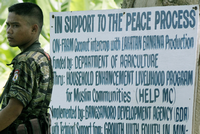
President Benigno Aquino of the Philippines surprised many when he covertly met Murad Ibrahim, the leader of the Moro Islamic Liberation Front (MILF), in Tokyo on August 4. The meeting was a clear step forward in a peace process that has haltingly dragged on for some 14 years. Yet the ripple effects it generated exemplify the intractability of the Moro issue and have added a new sense of urgency to the process. Although the content of the meeting remains unreported, it is generally agreed that the event was at least a useful trust-building exercise between warring parties struggling to overcome […]
With the world’s spotlight now shining on the climactic events in Libya, the struggle for meaningful transformation in neighboring Tunisia, whose authoritarian president was ousted by demonstrations some eight months ago, has largely been left in the dark. Tunisia’s youth uprising has widely been credited with sparking the greater Arab Spring. But the nation has yet to form an assembly to reform its constitution, and its economy has suffered increasingly this summer amid a near collapse in the nation’s tourism industry. There is, however, reason to feel optimistic, according to Emad Shahin, a Middle East specialist at Notre Dame’s Kroc […]

With the breaking of Libya’s many-month stalemate, the end of a 42-year reign of megalomaniacal tyranny has arrived. As the rebels attempt to consolidate power in Tripoli, however, what lies ahead for Libya as a nation and for the foreign powers that paved the way for Moammar Gadhafi’s ouster remains far from certain. Key to the future of a viable Libya will be law, stabilization and reconstruction so that civil society can be re-established swiftly. After four decades of inequity, revenge will be hard to avoid. Nonetheless, Libya’s National Transitional Council (NTC) has emphasized to rebel fighters that retribution against […]
The Peruvian government’s suspension of coca eradication operations last week raised the question of whether newly elected President Ollanta Humala might embrace a pro-coca legalization policy in line with that of President Evo Morales in neighboring Bolivia. In addition to suspending eradication, Humala also replaced Peru’s top counterdrug and intelligence officials. However, according to Coletta Youngers, a senior fellow at the Washington Office on Latin America and specialist in international drug control policy, neither development signals an aggressive shift in Peru’s counternarcotics policy. Youngers cautioned Trend Lines this morning not to “read more into what has happened with [Peru’s] eradication […]

In recent weeks, pundits, diplomats and assorted foreign policy wonks have started raising the alarm on U.S.-Russia relations, with the Obama administration’s much-trumpeted “reset” seeming to be increasingly under threat. A recent travel ban by the U.S. State Department on certain Russian officials believed to be involved in the death of lawyer Sergei Magnitsky elicited an angry response from Moscow threatening cooperation in areas ranging from Afghanistan to North Korea. Russia’s ambassador to NATO, Dmitry Rogozin, has started grousing about U.S. missile defense plans again. And all of this comes against a backdrop of increasing criticism from Prime Minister Vladimir […]
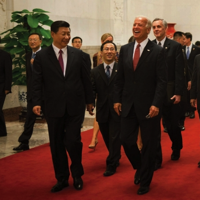
It is amusing to hear U.S. politicians of all ideological stripes sounding like classic libertarians as they proclaim that, in these times of fiscal austerity, the United States should no longer act as the “world’s policeman” and that other countries should be contributing “their fair share” to global security. Nevertheless, the many studies undertaken by the fellows of the Cato Institute, a libertarian think tank, detailing how the United States can shift to becoming an “offshore balancer,” thereby reducing its footprint around the world, and how our European and East Asian allies can afford to do more in the service […]
At long last, Washington looks ready to pass free trade agreements with Colombia, Panama and South Korea. Congressional ratification has been a long time in the making — the trade agreement with Colombia was signed in 2006, while the agreements with Panama and South Korea were inked in 2007. The trade deals with Colombia and Panama were, in some sense, part of a last-ditch effort by President George W. Bush to salvage the work put in by former Presidents George H.W. Bush and Bill Clinton to create the Free Trade Area of the Americas. Hopes for that hemisphere-wide trade zone […]
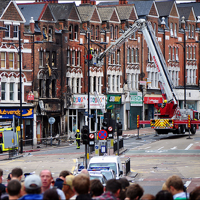
Amid the anxiety and devastation of the London riots, there was one brief comic interlude, when the government of Iran urged British authorities to use restraint in dealing with protesters. The appeal was bitterly amusing, of course, because of the brutal tactics Tehran used to put down protests in 2009. Police in London managed to end the rioting using traditional crowd-control methods. But then, in the wake of a public outcry over the disturbances and the disappointing performance of the police, British Prime Minister David Cameron made a highly controversial proposal: Next time, he suggested, the government might choke off […]
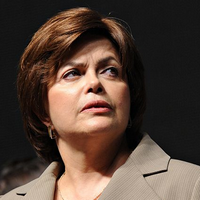
Brazilian President Dilma Rousseff has had a rocky seven months in office. Having already shuffled her cabinet three times, twice due to corruption scandals, Rousseff is now facing a brewing controversy in the Tourism Ministry that has the potential to force a fourth cabinet change. One might expect the shaky start to undermine Rousseff’s credibility, but so far she has managed to weather the storm. Despite her lack of charisma, her inexperience as a politician and a cabinet tainted by corruption allegations, she remains popular. Her approval rating stands at 67 percent, according to a poll by Brazilian firm IBOPE […]
Thailand’s new Prime Minister Yingluck Shinawatra made headlines this week by forming a cabinet void of any members tied to the nation’s pro-democracy “Red Shirt” movement. Yingluck is the sister of Thaksin Shinawatra, who was ousted from the prime minister seat in 2006 by a military coup, and it is widely accepted that her election as the first female to hold the office depended heavily on support from the Red Shirts. But she’s taking care now not to identify herself too closely with the movement whose massive demonstrations brought Bangkok to its knees last year. According to Paul Chambers, head […]
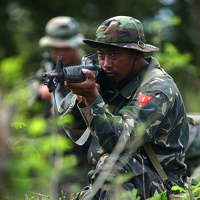
Despite numerous statements by Philippine and U.S. authorities over the past few years highlighting progress in the fight against terrorism, recent events in the southernmost corner of the Philippines show that the battle there is far from won. On Aug. 1, seven Philippine marines were killed — five of them beheaded or mutilated — and 21 others wounded after being ambushed by some 300 alleged members of the Abu Sayyaf Group (ASG) in Patikul, in the Sulu Archipelago. Unconfirmed reports say that 11 ASG members were also killed in the fighting. The ASG, often labeled a local terrorist group, has […]

The riots this past week in the United Kingdom, coming on the heels of the terrorist attack in Norway last month, the protests in Greece and the tsunami and subsequent nuclear accident in Japan earlier this spring, should be a wake-up call to Europe and the rest of the developed world that it cannot ignore the domestic side of the national security equation. It is time to dispense with the hubris of thinking that natural disasters, civil unrest or terrorism produces instability only in countries like Haiti or Iraq. And as Reuters correspondent Peter Apps notes, while a massive police […]
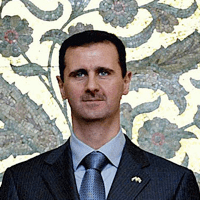
Of all the uprisings underway in the Middle East, none has the immediate potential to tilt the regional balance of power to the degree that Syria’s does. Under the Assad dynasty, Damascus has played a pivotal role in determining the relative strength of rival powers. Now, with the government of President Bashar al-Assad under pressure from its own people and with the brutality of the regime’s repression raising a popular outcry throughout the world, the principal powers in the Middle East are maneuvering to solidify their positions and reinforce their claim to regional leadership. Mideast powers are moving their chess […]
